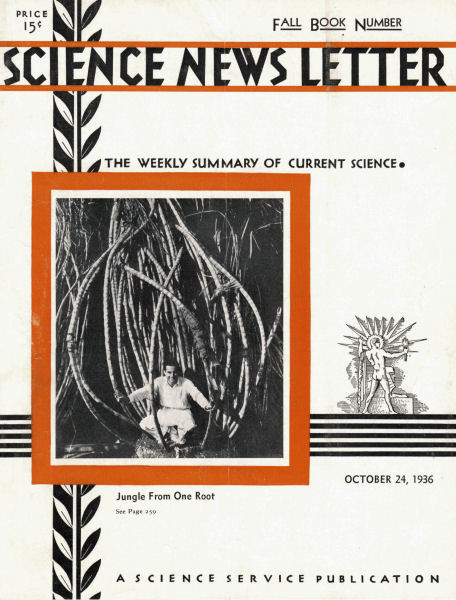From the October 24, 1936, issue

ALMOST A JUNGLE SPROUTS FROM ONE SINGLE ROOT
Sugarcane is a giant grass, and “stools out” from the root as other grasses do. In a recent fair on the island of Kauai, Hawaii, a prize was offered for the biggest stool of cane. It was taken by the one shown on the cover of this week’s Science News Letter. This one-root jungle of thirty-foot stalks would have yielded about 400 pounds of sugar. Lindsay Faye, manager of the plantation growing it, is also shown.
CHECK GROWTH OF CANCER IN ANIMALS BY DIETARY MEANS
A diet which checked the growth of breast cancer in mice “for prolonged periods” is reported by Drs. Carl Voegtlin, J.R. Thompson, and Mary E, Mazer of the U.S. Public Health Service’s National Institute of Health (Public Health Reports).
“It is not to be understood that the reported results hold out any immediate hope of checking human cancerous growth by diet,” the scientists emphasize.
Further extension of the dietary experiments reported, however, “may eventually furnish knowledge possibly leading to some practical applications,” they cautiously state.
The diet which checked growth of cancer in animals was one that lacked lysine, an amino acid essential for growth. The scientists explain their work and its results as follows:
“Both normal and malignant tissues contain proteins and the continuous growth of both types of tissues requires the continuous construction of new proteins. Without this, tissue cannot grow because proteins are essential components of tissues. Proteins are very complex chemicals which are built up from 21 different simpler chemicals, the so-called amino acids. Some of these amino acids apparently cannot be made by the animal organism, but are manufactured by plants. They must therefore be present in the diet in adequate amounts, otherwise normal growth of young animals is impossible. This raises the question whether it is possible to check cancerous growth by feeding animals on a diet deficient in one of these amino acids which are known to be essential for normal growth.
“The present report shows that malignant growth is checked for prolonged periods in animals fed on a diet deficient in the amino acid lysine. It is shown furthermore that after a period of inhibition of malignant growth the addition to the diet of a relatively small amount of lysine causes a striking stimulation of tumor growth.
“It is believed that these observations show for the first time that it is possible to check the growth of a typical cancer in animals by means of a specific dietary deficiency. This is contrary to the current belief based on clinical experience and previous results obtained by experimentation on animals.”
INSECT-KILLING FUNGI ARE RAISED SUCCESSFULLY
Fungi that kill flies, mosquitoes, and other annoying and harmful insects are now raised successfully in mass cultures by a German botanist, Dr. Georg Schweitzer, of Hohenheim. He uses a new method of sterilizing the culture media on which they feed before they are turned loose on their winged victims; it involves the use of chemical vapors instead of the customary heat treatment.
The efficacy of certain fungi against insects has long been known, but technical difficulties attending their culture in large quantities has handicapped their practical use.







